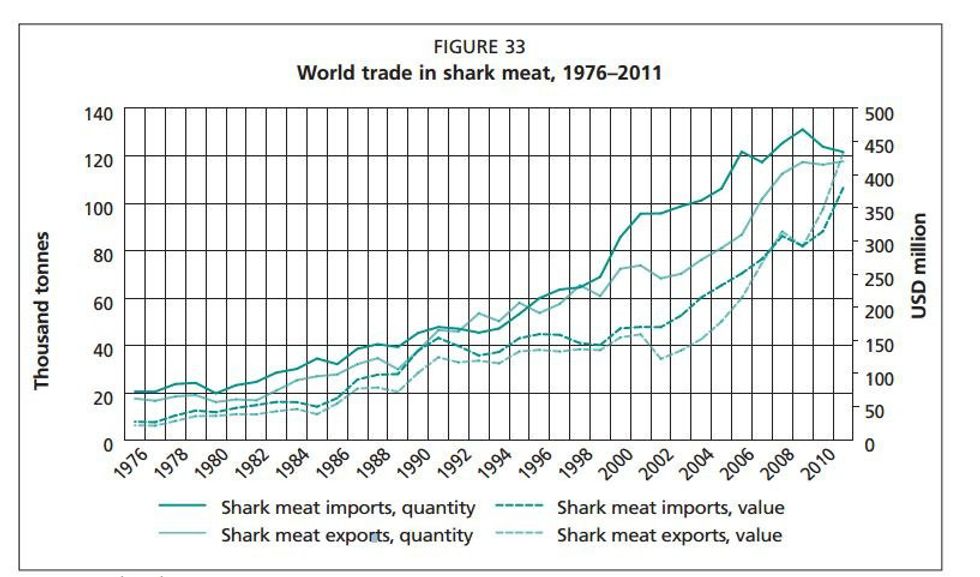Sharks are important. The oceans need them, the fish need them, and we need them. Since sharks are apex predators, everyone and everything is affected when there is a drastic change in their population.
Here is a super simplified version of what could happen: shark populations decrease, leading to the increase of cownose ray populations, meaning shellfish populations decrease, and phytoplankton and zooplankton populations increase, creating a massive algae problem in a once-thriving ocean. Sharks keep ecosystems balanced, but their populations are declining at an alarming rate primarily due to humans catching and killing them.
At the rate they are declining now, around 25 percent of current species could be extinct within the next 10 years. Shark finning (slicing off a shark's fin and throwing the body back into the sea where it dies) seems to be the main problem here, but finning isn't the only problem we should be focusing on.
Shark finning is a huge contributor to the massive decline in shark populations. Back in August, UPS banned the shipment of shark fins (which are legal to ship) after presented with a petition with over 177,000 signatures. It doesn’t destroy the market for shark fins, but it does make it that much more inconvenient for countries in the shark fin market to get shipments. This is a fantastic example of how we actually can make a big impact and make things happen if we take action.
Laws and regulations regarding shark finning vary from country to country, but are hard to enforce. Some areas of the sea remain un-policed due to lack of funds in some countries, or just aren't top priority. The shark fin laws, regulations and bans are a great first step to preserve the species, but it is far from enough. In fact, the trade for shark meat has increased by 42 percent since 2000 even though the trade for shark fins has gone down.
The focus has been on shark finning for so long that another huge problem has been ignored. Shark fishing is really what needs better laws, bans, regulations and more attention. There are uses for other parts of shark that aren't well known: some cosmetics (look for the ingredient squalene or shark liver oil), leather, shark cartilage pills and other supplements, imitation crab and lobster and shrimp, and shark souvenirs that aren't fossils. Since there is such a market for other parts of shark, bans on fins aren't going to do much about the total number of sharks killed.
It’s tempting to play the blame game with China because shark fin (Yu Chi) soup is traditionally served at weddings. However, many Chinese who have eaten shark fin soup did not even know that they were eating shark fin, because Yu Chi translates to “fish wing.” In reality, the United States and many other countries play a pretty big role exporting shark meat (the U.S. is the 7th largest producer) and a small role in importing. The U.S. does have rules and regulations against shark finning, but those do not help much with the shark fishing. See the problem here? Despite regulations on finning, it is still legal in many instances to bring sharks to shore with the fins still attached, where they can then be cut and sold. No cutting and throwing the shark back into the water involved, but they are still being killed.
So what do we do? It’s a fragile situation for sure, especially since the market for shark meat is rising. After laws are put in place, enforcing them is going to be very difficult. That doesn't mean we shouldn't try (and succeed!) to get this situation under control. It will take time for sure, but things like these don't happen over night.
The best thing to start with is raising awareness about the problem at hand and gaining support. If people aren't aware of a shark's value, they aren't going to care about the cause. Gaining support for protecting sharks might be slightly harder than protecting other animals, such as turtles or manatees, for example. Turtles and manatees are seen as cute and innocent, while sharks are more intimidating and deadly. But without support, the cause will have no petition signers, nobody to donate money, and nobody to take a stand.
Just recently on Oct. 9, a Taiwanese ship was caught illegally shark finning and will face penalties, including a suspended license. Events like these need to be published and shared to spread awareness of the severity of the issue. We need to use social media to our advantage. Once people become aware of the issues (both finning and fishing), they will become hard to ignore.
#sharklivesmatter



















